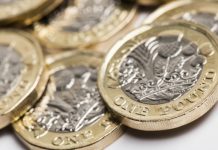- Australian Dollar (AUD) remains resilient even as government outlines the carnage caused by the coronavirus crisis
- Australia keeps triple A rating despite ballooning debt
- Pound (GBP) under pressure as UK – Chinese tensions rise and Brexit talks stall
- No significant UK data due today, attention moves to BoE’s Jonathan Haskel who speaks later
The Pound Australian Dollar exchange rate (GBP/AUD) is extending losses for a third day on Thursday. The pair settled in the previous session -0.2% at 1.7833. At 08:00 UTC, GBP/AUD trades -0.2% at 1.7786. The pair has shed almost 1.5% over the past three days.
The Australian Dollar trades higher across the board, boosted by an upbeat mood in the market amid hopes that the US will agree to additional fiscal stimulus in the coming days and following better than forecast earnings from Microsoft and Tesla overnight.
The risk on mood is lifting the Aussie, despite National Bank of Australia Business Confidence gauge slipping lower to -15 quarter on quarter, this is worse than the previously revised -8 and -12.
Australian Treasurer Josh Frydenberg laid out just how much damage the coronavirus crisis was inflicting the Australian economy. Josh Frydenberg forecast -3.75% GDP contraction for 2020 and unemployment to peak at -9.25% in December. The Australian budget deficit has also blown out from almost 0 to AUS$86 billion in 2019/20 with an additional US$184.5 billion deficit expected in the year to June 2021.
Gross debt was expected to surge to AUS$168 billion by mid-2021 to AUS$851.9 billion or 45% of GDP. However, this is still low by developed country’s standards. Importantly international rating agency S&P said that this would not threaten Australia’s triple A rating.
The Pound remains under pressure amid little progress in Brexit talks and as UK – China tension ratchet up a notch.
China has warned the UK that opening citizenship to Hong Kong residents is violating international law. The British decision to allow 3 million Hong Kong residents into the UK comes in retaliation to China’s national security law on the former British colony, which ends freedoms promised in 1997 when the colony was returned to China.
Looking ahead there is no high impacting UK data to be released. Investors will look ahead to a speech by Bank of England’s Jonathan Haskel for any further clues as to the likelihood of negative interest rates





